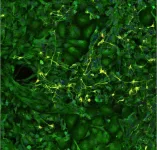(Press-News.org) New research from University of East Anglia reveals why some children may be slower to learn words than others.
A study published today investigates where toddlers look when they learn new words. It finds that children with larger vocabularies looked quickly towards objects when learning new words.
Meanwhile, children who knew fewer words looked back and forth between objects and took more time.
The research team say that their findings could help identify children with delays in language development at an earlier stage.
Importantly, it means these children could be given earlier support to build their best vocabulary before starting school.
Lead researcher Dr Larissa Samuelson, from UEA’s School of Psychology, said: “At around two years of age, children start to be quicker to decide what a new word means. We think this is because many of the first words children learn are names for sets of things that are similar in shape – balls are round, cups are cup-shaped.
“Children learn that if you hear a new word, other objects that are the same shape can also most likely be called by this name.
“This helps them learn new words quickly because they have an idea what a new word means right away.
“But there may be differences in the way that children who struggle with language learn new words and understand what new words mean.
“We wanted to better understand this phenomenon to see how it could support early word learning.”
The research team studied how 66 children aged between 17 and 31 months learn new words in a simple game.
They showed the toddlers new objects made from clay, plaster, Styrofoam, yarn and plastic mesh. The researchers then told the children the names of the new objects and asked them what other things can also be called by that name.
Crucially, the team filmed where the children were looking throughout the task. They were then able to watch it back frame-by-frame to see where the toddlers were looking before and after they were presented with a new object.
“We know that when adults and children hear a word they know, they look towards things in the world that match the words they hear. We wanted to see if this was different depending on how many words you know,” said Dr Samuelson.
So the researchers also asked parents how many words their children can say.
Dr Samuelson said: “We found that children who can say more words quickly looked towards objects that were the same shape as a named object. Children who knew fewer words looked back and forth between the objects and took more time.
“Other research has shown that children with Developmental Language Disorder do not pay attention to the same things when learning new words as children with typical language development.
“At the moment you can’t diagnose children with Developmental Language Disorder until they are three or four. But we hope that our findings could help determine which children are at risk for language delay at an earlier stage so that they can get better support.
“Our research has previously shown that we can boost word learning in children by helping them learn what to pay attention to when they hear a new word.
“If we can figure out which children need this support earlier, we can help them build their best vocabulary and be more ready to enter school with the language skills they need.”
This research was led by the University of East Anglia in collaboration with Augustana College, Illinois (US) and Durham University.
‘Vocabulary and automatic attention: The relation between novel words and gaze dynamics in noun generalization’ is published in the journal Developmental Science.
ENDS
END
Research shows why some children may be slower to learn words
2023-04-19
ELSE PRESS RELEASES FROM THIS DATE:
Talking therapies linked with reduced risk of cardiovascular disease
2023-04-19
Sophia Antipolis, 19 April 2023: Effective management of depression through psychological therapy is associated with a lower likelihood of heart disease and stroke, according to research published today in European Heart Journal, a journal of the European Society of Cardiology (ESC).1
“Our study suggests that improving mental health could also help physical health, especially in those aged under 60,” said study author Ms. Céline El Baou, a PhD student at University ...
Talking therapies could reduce future risk of cardiovascular disease
2023-04-19
Using talking therapies to effectively treat depression in adults over the age of 45 may be linked with reduced rates of future cardiovascular disease, finds a new analysis of health data led by UCL researchers.
In the first-of-its-kind study, published in the European Health Journal, researchers assessed whether evidence-based psychological therapies, such as cognitive behavioural therapy (CBT), used to treat depression could play a role in reducing the risk of cardiovascular disease later in life.
Cardiovascular diseases, such as stroke and heart disease, are the leading cause of death worldwide. They represent 32% of ...
Investigating the growth of snow algal blooms on Mount Gassan, Japan
2023-04-19
Rising temperatures have led to the growth of algal blooms in water bodies, mountainous areas, and coastal regions as far as the Arctic. Recently, pigmented snow algae have been spotted on Japan’s Mount Gassan after the winter season. The presence of such algal blooms is concerning because they reduce the reflectivity of snow-covered surfaces, resulting in faster snow melting. Additionally, the algal blooms can have unforeseen impacts on the surrounding wildlife and vegetation. The growth and color of snow algae in mountainous areas appear to differ depending on the season, elevation, ...
Vesicles produced by intestinal bacteria cause a malignant cycle in patients with cirrhosis
2023-04-19
Niigata, Japan - Researchers from Niigata University and Kyoto Prefectural University have revealed that small vesicles, around 100 nm in size, released by intestinal bacteria induce immune activation and progression of liver cirrhosis, as well as reduction of serum albumin level, subsequently leading to edema and ascites.
The global prevalence of cirrhosis is high and it can be fatal upon progressing to end-stages. The progression of cirrhosis results in various symptoms including jaundice, ascites, rupture of varices, and hepatocellular carcinoma. Often, even if root causes, such as hepatitis virus, alcohol, and lifestyle factors, ...
77% of Americans have used addictive behaviors or unhealthy coping mechanisms to manage their mental health, according to Myriad Genetics nationwide survey
2023-04-19
From restricted or binge eating to excessive gambling to extreme social media use, 77% of Americans surveyed say they have used at least one addictive behavior and/or unhealthy coping mechanism to manage their mental health issues, according to the GeneSight® Mental Health Monitor, a nationwide survey from Myriad Genetics, Inc. (NASDAQ: MYGN).
Nearly all Americans (94%) surveyed agree that substance and behavioral addictions often mask underlying mental health issues. Though they may view these behaviors as addictive or as unhealthy coping mechanisms (or both), many ...
New open access journal series offers a fast and supported author experience
2023-04-19
Researchers looking to share their work openly and at pace have an exciting new publishing option that delivers on reach and impact. Launched by Taylor & Francis, the Elevate Series of broad-scope open access journals offers a fast, streamlined experience and full support in navigating the publication process.
Authors will experience the editorial excellence and high ethical standards of Taylor & Francis journals, along with personalized support at every step, allowing them to efficiently publish their work and comply ...
Time of day and a patient’s sex may alter the effectiveness of blood pressure medication
2023-04-19
New research from a team based at the University of Waterloo suggests that the time of day and a patient's sex may alter the effectiveness of certain blood pressure medications.
Biological sex and the body's circadian clock are critical factors in managing blood pressure. The circadian clock is a natural, internal process that regulates things like the sleep-wake cycle and repeats roughly every 24 hours. Among its many other functions, the circadian clock also regulates kidney function. The kidneys play ...
Young adults with cancer at greater risk for HPV-related cancers
2023-04-19
A team of researchers at Huntsman Cancer Institute and the University of Utah (the U) found that human papillomavirus-related cancer diagnoses are more common in adolescent and young adults (AYAs) who have previously had cancer. The team is led by Anne Kirchhoff, PhD, MPH, investigator in the Cancer Control and Population Sciences Research Program and associate professor of pediatrics at the U.
Human papillomavirus (HPV) is a very common infection spread through sexual contact. ...
Could this copycat black hole be a new type of star?
2023-04-18
It looks like a black hole and bends light like a black hole, but it could actually be a new type of star.
Though the mysterious object is a hypothetical mathematical construction, new simulations by Johns Hopkins researchers suggest there could be other celestial bodies in space hiding from even the best telescopes on Earth. The findings are set to publish in Physical Review D.
“We were very surprised,” said Pierre Heidmann, a Johns Hopkins University physicist who led the study. “The object looks identical to a black hole, but there’s light coming out from its ...
Exercise boosts brain health with chemical signals
2023-04-18
Physical activity is frequently cited as a means of improving physical and mental health. Researchers at the Beckman Institute for Advanced Science and Technology have shown that it may also improve brain health more directly. They studied how the chemical signals released by exercising muscles promote neuronal development in the brain.
Their work appears in the journal Neuroscience.
When muscles contract during exercise, like a bicep working to lift a heavy weight, they release a variety of compounds into the bloodstream. These compounds can travel to different parts of the body, including the brain. The researchers were particularly interested in how exercise could ...









